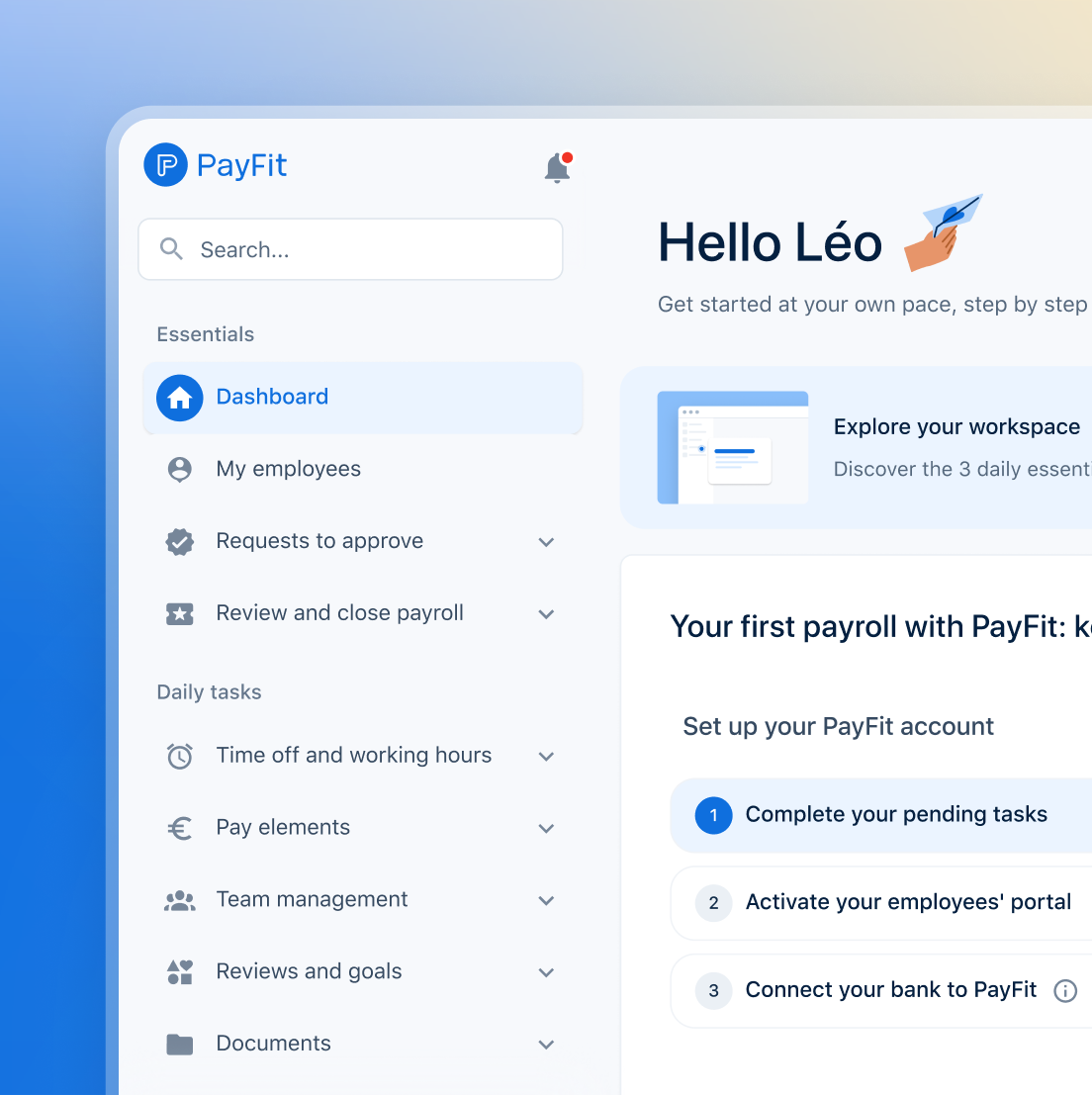✨ Health insurance, now in PayFit - learn more
💷 All the rates & thresholds you need to know for 25/26...right here
✨ The Payroll Journey: Start, Scale & Succeed Globally - learn more
✨ Health insurance, now in PayFit - learn more
💷 All the rates & thresholds you need to know for 25/26...right here
✨ The Payroll Journey: Start, Scale & Succeed Globally - learn more

Every UK business incurs certain costs and expenses to keep the lights on and ensure operations run smoothly.
It can sometimes consume a lot of time and be extremely challenging to manage and track a wide range of different expenses, and therefore demands a good expense accounting and management system. Effective expense management software is a crucial part of finance management and accounting, helping you track spending and claims in detail, and maintain healthy company finances each month.
It gets even more confusing when you need to pay corporation tax on some expense items—disallowable expenses—and not others—allowable expenses. How do you tell the difference? Well, we’ve written this guide to help growing UK businesses like yours!
After reading, you should know exactly what allowable and disallowable expense items are, the differences between these expenses, and typical examples of both types.
Allowable expenses is a term used to describe the range of different expenditures you will incur while running your company that you can claim as tax deductions. This expense category covers items that, since they are not taxable, help you reduce how much you pay on your profits. Therefore, proper management of these expense items is a key part of good accounting, and helps businesses save money over time, and improve the business’ finances.
Let’s consider an easy-to-understand example:
Say your company made £30,000 at the end of the year, and you spent £5,000 on allowable business expenses. You won’t need to pay tax on the entire £30,000. Instead, you’ll only pay tax on £25,000 (because £5,000 was spent on allowable expenses).
To be clear, for an expense to be considered allowable, it must be spent solely for the purpose of running your business and nothing else.
Here are some common cost categories and different items in those categories that you can claim as allowable expenses.
Office, property, and equipment: This covers items such as rent and office phone bills, and stationery, fax, postage and printing costs, as well as other small office tools and equipment. This also includes the pricing and plans for essential accounting, management, admin and office software, or a new productivity app, that your teams might use on a month-to-month basis.
Car, van, and travel expenses: Expenses like fuelling, servicing, vehicle insurance, license fees, business travel visas, train tickets, and bus fares are covered in this category. You should note, however, that the expense of the daily commute to and from work are excluded from the category. Since accurate mileage logs are essential for travel claims, good expense management software helps employees easily track vehicle mileage and saves time on monthly reporting.
Clothing expenses: Clothing becomes an allowable expense if it is spent on a uniform, any specific personal protective equipment or clothing needed for work, or any required clothing materials, for instance, costumes because you’re an entertainer. Regular clothing worn for work does not count as an allowable expense.
Staff expenses: This includes expense items such as salaries, bonuses, pensions and employer’s National Insurance Contributions (NICs) for all employees. Proper management of employee payments and related spending starts with following recruitment best practices, which good HR software will help you streamline.
Reselling goods: This covers costs and charges to acquire raw materials, produce sellable goods, and transport materials.
Legal and financial costs: This covers bank charges, charges for credit cards and debit cards, overdraft fees, interests on business loans, late invoice payment fees, and the cost of hiring financial specialists or professionals such as accountants, auditors, and solicitors.
Marketing, entertainment, and subscriptions: This includes expenses for subscribing to trade journals and magazines, advertising in printed media, and building a business website.
Training courses: Expenses on classes that help your employees improve their skills in your current business count as allowable expenses. These, however, do not include courses that train you to start a new business.
Home office and hybrid working expenses: A flat-rate deduction of up to £6 per week can be claimed by work-from-home employees. New guidelines clarify the allowable treatment of utility payments and internet expenses for such hybrid workers.
Payroll software guide
The process to claim allowable expenses involves summing up all your expenditures and including them in your tax return. Keeping accurate records makes the process much smoother.
Although you don’t need to submit proof to HMRC, it’s vital to keep an accurate record. HMRC requires digital receipts to be stored in a secure format with clear audit trails. A good expense management software and app system creates a clear approvals process to track every digital receipt and simplify the claims cycle for every pay month. This makes managing each and every individual receipt and its validation much simpler at the end of the month.
“Disallowable expenses” are expense items that, although closely related to your business, you cannot claim as corporation tax reductions in the UK. Both employers and employees need to be aware of this in order to avoid issues at the year-end. Since these expense items are business-related, it’s easy to mistake a disallowable expense item for an allowable one.
If you’re wondering what to categorise as a disallowable expense, ask yourself and encourage your employees to ask themselves: “Is this expense solely for the purpose of running the business, or does it benefit me personally in any way?”
Expense items with personal benefits are considered disallowable, and are therefore taxable. This also includes the benefits-in-kind that you might offer to employees or directors.
Here are some examples of disallowable expenses:
Business entertainment: This includes entertainment, gifts and hospitality you offer to clients, customers, other businesses, or suppliers.
Loan repayments: Personal loans (even if it’s to help run your business) and overdrafts count as disallowable expenses.
Clothing: Everyday clothing or attire is considered a disallowable expense.
Asset depreciation: Charges incurred to manage the depreciation of assets, such as vehicles and other work equipment, are classed as disallowable expenses.
Fines and penalties: This includes all charges you incur for breaking the law. Examples include parking fines and VAT penalties.
Donations: Any donations you make to charities, clubs, associations or political parties are considered disallowable expenses.
It is not enough to simply know the difference between allowable and disallowable expenses. You also need an easy way to handle and manage all this business spending month by month. Without the right support, this finance task can be challenging and take up a lot of time.
To save time and money, it’s crucial to use proper payroll software, which helps manage employee payroll and their submitted claims, and forms an integral part of a strong people management strategy. With proper management, you’ll avoid finding yourself overwhelmed with paperwork and dealing with employees unhappy about inaccurate deductions on their wages. This is the key to happy and productive teams that stay on budget.
PayFit’s platform software and mobile app ecosystem is the perfect expense management software for small and growing businesses in the UK. It is rich in expense management features that make it easier to track all allowable and disallowable expense items. These features simplify the process of claims approvals and reimbursements for all users and employees.
PayFit’s software simplifies your financial administration. It empowers all users to generate clear finance and management reports while closely monitoring company spending on payment cards or by invoice. Fully compliant with HMRC guidelines and backed by dedicated support, this powerful tool streamlines your entire process, making year-end accounting significantly easier.

Key changes include new provisions for hybrid working costs, explicit inclusion of electric vehicle charging expenses, and clearer guidance on digital business expenses. HMRC has also introduced a simplified home working allowance.
The flat-rate deduction for home working has been updated to £6 per week, and new guidelines clarify the treatment of utility costs and internet expenses for hybrid workers. Capital improvements to home offices remain disallowable.
Yes, HMRC now requires that every single receipt be stored in a structured, digital format, with clear audit trails showing business purpose. Any cloud-based accounting and bookkeeping systems you use must meet specific criteria for expense tracking, and it is important that your methods concur with their requirements.
Yes, but with new restrictions. Virtual networking events are allowable when they are primarily for business purposes, but the payments must be reasonably allocated between the business and any entertainment elements. The rule means you can claim the cost of a virtual event as a business expense, but only the portion of the event that is genuinely for business. If the event includes a significant entertainment element, you cannot claim the entire ticket price. Think of it like a traditional, in-person conference: you could claim for the conference ticket itself, but not for a separate ticket to a concert or theatre show organised for attendees in the evening.
HMRC has introduced specific guidance for electric vehicles, including charging costs and infrastructure investments. The costs of charging an electric vehicle for business travel are therefore now allowable expenses. This includes charging at the workplace or using public charging points. If an employee charges their company car at home, you can also reimburse this spending, but you must track the business mileage accurately to justify the claims. Using software or an app to log mileage and store charging receipts is the best way to maintain accurate records for your financial reports.
MTD for ITSA makes Making Tax Digital rules applicable to the Income Tax Self Assessment system. The main requirement is that businesses must use secure, MTD-compliant software to keep digital records and make summary reports to HMRC. This changes the process for how teams must track, process and report their business spending, as simple spreadsheet accounting will no longer suffice for tax submissions. The software you choose must therefore be able to generate quarterly reports detailing all business spend. Furthermore, the data format and submission method must concur entirely with HMRC’s new digital standards, creating a clear management audit trail for every expense.

Expense reimbursement is about more than just reimbursing staff. It’s about payroll & tax legislation too. Make sure you have all your responsibilities covered.

As a UK employer, understand what a PAYE Settlement Agreement (PSA) is, learn what benefits are covered, what's excluded, & the key deadlines involved.

Looking for expense management software in the UK? Discover how to automate expenses, reduce admin time and improve financial control with cloud-based tools.

Learn more about UK expense management best practices for SMEs: policies, digital tools, tax compliance and governance to streamline your process.

See what's new in PayFit
New features to save you time and give you back control. Watch now to see what's possible